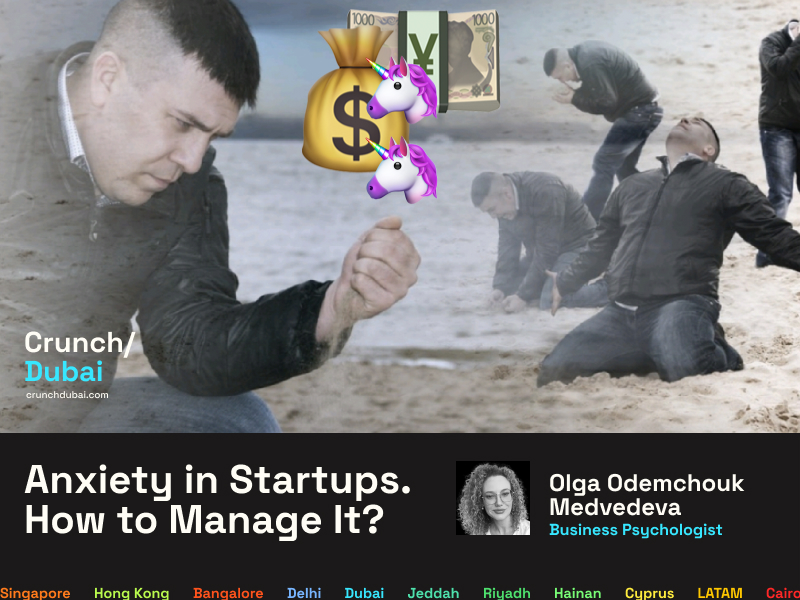Awareness is a key factor in success, including the matter of the emotional challenges of a startup life. Development of emotional intelligence is having detrimental effects on decision-making, risk management, and overall team performance.
What associations do you have with the definition of a startup, I will let myself assume that we are talking about “unicorns” and large investments. It is a very vivid image that is not a complete one. A complete representation is possible when you also take into consideration what is behind the colorful popular image.
Nature of Anxiety in Startups
Always been fascinated by the nature of entrepreneurship – risk-taking in the face of total uncertainty and a strong-willed sense of purpose. If I were asked to name just one feeling that entrepreneurship evokes, it would certainly be a profound sense of anxiety.
Now imagine the amount of anxiety that is present in startups, which are differentiated from ordinary businesses by their unique solutions and focus on rapid scaling.
A key cause of anxiety in startups is the high level of uncertainty. Uncertainty about what the outcome of the activity will be causes strong emotional reactions, the basis of which is fear. Uncontrolled negative emotions lead to dysfunctional behavior, both in the leader and the entire team. When employees work in a bad organizational culture or weak team cohesion, they are more likely to suffer from burnout and can be less engaged in the project.
What Anxiety Affects
Raw emotional situations lead to burnout, which combines emotional exhaustion and lack of personal satisfaction. Stress accumulation negatively affects startup and product development, making it difficult to reach adequate decisions and affecting the team’s overall performance.
Anxiety and fear affect decision-making in key aspects:
- Unrecognized emotions lead to suppression of critical signals, which prevents recognition of significant external threats and opportunities that require prompt managerial responses and solutions. Also, high stress levels and constant pressure lead to emotional drain, which affects the ability to perceive and experience emotions.
- Inability to manage risks. The key is not to try to avoid risks, but to be able to manage them constructively. Constructive risk management refers to a systematic and focused approach to identifying, analyzing, evaluating, and managing potential threats or negative consequences that may occur in the work process. Constructive risk management involves not only preventing negative situations, but also using risks as opportunities to improve the business and achieve objectives.
- Tunnel vision begins with an inability to manage complex feelings. A limited perception of the situation prevents you from seeing the bigger picture and making informed decisions.
- Fear of failure or inability to make mistakes. Mistakes are a natural part of any process. Those who don’t make mistakes are usually those who do nothing. Recognizing mistakes is the first step to correcting the situation.
- Fear of success, inability to step out of the comfort zone and lack of ambition lead to startup stagnation.
- Resistance to change – even successful startups need adjustments over time. Change can be perceived as a threat to familiar stereotypes and rewards.
What it Means to Work on Your Emotions?
Managing emotions is a critical skill for effective and ecological leadership. How can you work on your emotions?
- Understanding and recognizing emotions. Leaders and team members must be able to recognize their own emotions as well as the emotional states of those around them. This requires a high level of self-awareness and self-reflection. Understanding what emotions arise in different situations will help to better control them. Coaching can best help in this case. Remember the main rule, a psychologist is not needed only those who need a psychiatrist. Mental hygiene is as important as any other hygiene of your body.
- Managing emotions through the development of self-regulation skills. A leader’s ability to control his or her emotions and respond to them constructively plays an important role in creating a psychologically safe environment. This includes the ability to hold tension and redirect it.
- Transformation of emotions – the ability to discuss emotions, concerns and tensions within the team. Using humor and other ways to soften the emotional environment.
- Acceptance of contradictions and ambiguity (ambivalence) through the integration of opposing ideas. Also develops the creative ability to solve complex problems.
- Fair sharing of responsibility for the emotional state of the team – important to be able to interact with challenges not only at the resource of the leader.
Sustainable Solutions for Mental Management
Developing emotional intelligence and the ability to manage complex emotions is critical for startup leaders so that they can make effective and relevant decisions in an environment of high uncertainty and psychological pressure.
Sustainable solutions to startup emotional issues involve not only developing emotional intelligence, but also creating a culture that supports openness, mutual understanding, and fairness, which contributes to effective teamwork and successful project development.
Building a corporate culture with focused attention to the emotional climate in the team is realized via:
- Clear distribution of roles, responsibilities and boundaries in the startup, according to the talents and preferences of the team.
- Creating a reflective space in the organization itself: meetups, team coaching, facilitation sessions.
Anxiety as an Asset
Destigmatizing anxiety in a business context by recognizing negative emotions, adapting to them, and even benefiting from them allows developing cognitive flexibility in conflict situations and accessing creative and innovative power.
The energy of tension can stimulate new situations, lead to new levels or generate creative and innovative ideas if there is no attempt to avoid conflict and the dissociation of opposites.
So instead of avoiding or suppressing anxiety and fear, startup leaders must learn to deal constructively with these emotions by using them as a source of information, developing paradoxical thinking, and creating a psychologically safe environment for the team.
